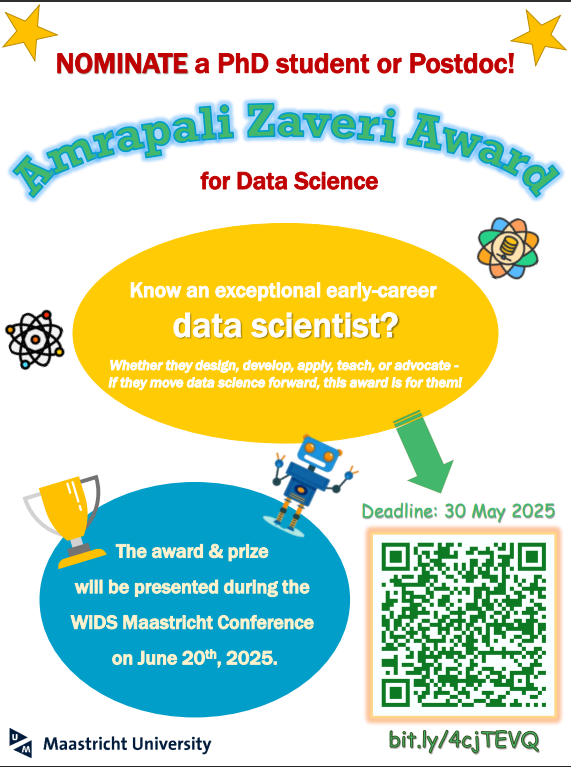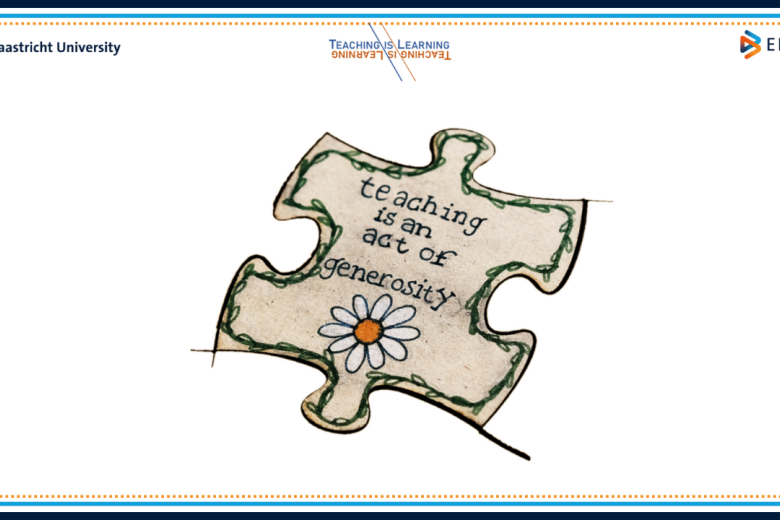Assistant Professor at FHML
The Amrapali Zaveri Award (AZA) 2025
The Amrapali Zaveri Award aims to recognize scholars for their contributions to the field of data science. This year (2025) we will present only 1 award: The Amrapali Zaveri Award for Early Career Data Scientist (for Ph.D. students and Postdocs)
Nominations for the Amrapali Zaveri Award for Data Science will be assessed by the awards committee, according to the candidate’s contributions to education, mentorship, research, advocacy, and/or community building. Additional consideration will be given to the candidate’s contributions to advancing the engagement of underrepresented minorities in data science.
Nominations
Nominate an Early Career Data Scientist
Do you know an early career researcher who inspired you and is a real ambassador for data science? Nominate a Ph.D. student or postdoctoral researcher by filling in this form. The deadline is Friday, 30th May 2025.

Winners AZ Awards 2024
Last year's winners of the Amrapali Zaveri Awards were Meike Thijsen (Future Data Scientist) and Denise Slenter (Early Career Data Scientist). Congratulations!
Coordination
This year, the Amrapali Zaveri Awards for Data Science are coordinated by Anna Schüth and Bernice Breuer. The prize is partially funded by Aspasia-NWO (Grant 91716421).
Anna Schüth


Transforming full compensation: a model legislative proposal and guidelines for pain and suffering damages
- Law
The EU-funded project FullCompensation aims to make the compensation of pain and suffering damages more equitable and efficient. To this end, the project led to the development of a model legislative proposal and guidelines, based on comparative and empirical evidence. These documents are intended as a source of inspiration for EU Member States and adjudicators that are considering reforming or establishing their own systems for the quantification of pain and suffering awards.

Legal redress for victims of UN soldiers
- UM in the press
“Wie als slachtoffer zijn recht zoekt, verdwaalt gemakkelijk in juristerij en een wereld waarin veel

UM Education Days 2023 recap and save the dates for 2024
- UM news
We are delighted to share the highlights of UM Education Days 2023 through our dedicated recap page, including a beautiful video impressi

About the project
In order to identify (the interactions between) the genetic, clinical and environmental determinants, EU-GEI have employed family-based, multidisciplinary study paradigms, which allowed for efficient assessment of gene-environment interactions.
The translation of the results to the clinical practice have been facilitated by additional experimental research and by risk assessment bioinformatics research. This has enabled (i) the identification of modifiable biological and cognitive pathways and mechanisms and (ii) the construction of Risk Assessment Charts and Momentary Assessment Technology tools. These tools contributed to the early prediction of (i) transition to psychotic disorder in (at-risk) help-seeking individuals, (ii) diagnosis and (iii) monitoring of outcomes.
EU-GEI will additionally include a user-led PhD project, and aims to impact on mental health and societal issues as called for in the European Parliament Resolution on Mental Health in Europe (INI/2006/2058 – see B3, impact).
Maastricht University (MUMC) coordinated the project. Project Coordinator was Professor Jim van Os, Director of clinical research in MHeNs, the research School Mental Health and Neuroscience at MUMC and head of the research line of Psychiatric Ecogenetics, or gene-environment interactions (GxE).
If you want to request the instructional videos from the old eu-gei site you can ask Bea Campforts to send you the required videos.